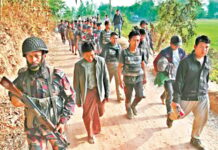
A Jamaat-ul-Mujahideen Bangladesh leader wanted in connection with the Holey Artisan Bakery attack in Dhaka’s Gulshan was arrested from a central Kolkata hideout earlier this week.
Mohammad Idris, one of the “most wanted” suspects in the July 1 café attack in which 20 people were killed, was hiding in the Burrabazar area, according to information passed on by a special cell of Delhi police to Kolkata police.
“There was specific information that Idris was shuttling between Hyderabad and Kolkata and was trying to recruit and radicalise youths for the cause of Rohingyas,” a source said.
Concentrated in western Myanmar, the Rohingyas are considered by the UN as the “most persecuted minority group in the world”
In Muslim-majority Bangladesh, there is considerable support for the Rohingya Muslims. As the persecution of Rohingyas is an emotive issue in Bangladesh, the JMB, intelligence sources said, is trying to use it to regroup after the Sheikh Hasina government cracked down on extremist elements after the café attack.
According to the information gathered by Delhi police, Idris was actively involved in the attack on the Gulshan café and he fled the country immediately thereafter to escape the Bangladeshi security agencies.
“He had sneaked into India and found shelter at a place in Colootola near Burrabazar at least three months ago. He was moving between Kolkata and Hyderabad and taking instructions from the JMB top leader Salhein to work for the cause of the Rohingyas,” an intelligence source said.
Salhein, according to the central agencies, heads both the Indian and Bangladeshi chapters of the JMB and is said to be hiding somewhere in India.
A fortnight ago, a Delhi police team had come to Kolkata and conducted an operation, jointly with the officers of the central Intelligence Bureau to pick up Idris. The operation, about which Kolkata police was not informed, had drawn a blank.
After the failed attempt, the central agencies had shared the information about Idris with Kolkata police and sought their assistance. Kolkata police arrested him from Colootola and handed him over to the special cell of the Delhi police earlier this week.
Sources said their counterparts in Bangladeshi counter-terrorism unit have been informed of the catch and if need be, they would be allowed to interrogate Idris.
On the night of 1 July 2016, at 21:20 local time, five militants took hostages and opened fire on the Holey Artisan Bakeryin Gulshan Thana—an affluent area with many embassies in Dhaka, Bangladesh. The assailants entered the bakery with crude bombs, machetes, pistols, and took several dozen hostages (foreigners and locals). In the immediate response, while Dhaka Metropolitan Police tried to regain control of the bakery, two police officers were shot dead by the assailants.
29 people were killed, including 20 hostages (18 foreigners and 2 locals), 2 police officers, 5 gunmen, and 2 bakery staff. As the police were unsuccessful in breaching the bakery and securing the hostages, they set up a perimeter along with the Rapid Action Battalion and Border Guards Bangladesh. Very early on 2 July (around 03:00), it was decided that the Bangladesh Armed Forces would launch a counter assault named Operation Thunderbolt.
The assault was led by the 1st Para-commando Battalion, an elite force in the Bangladesh Army, and began their raid at 07:40. According to Bangladesh’s Inspector General of Police, all of the attackers were Bangladeshi citizens. Islamic State of Iraq and the Levant (ISIL) claimed responsibility for the incident and released photographs of the gunmen, but the home minister of Bangladesh, Asaduzzaman Khan, stated that the perpetrators belonged to Jamaat-ul-Mujahideen and were not affiliated with ISIL.
Source: The Daily Ittefaq









